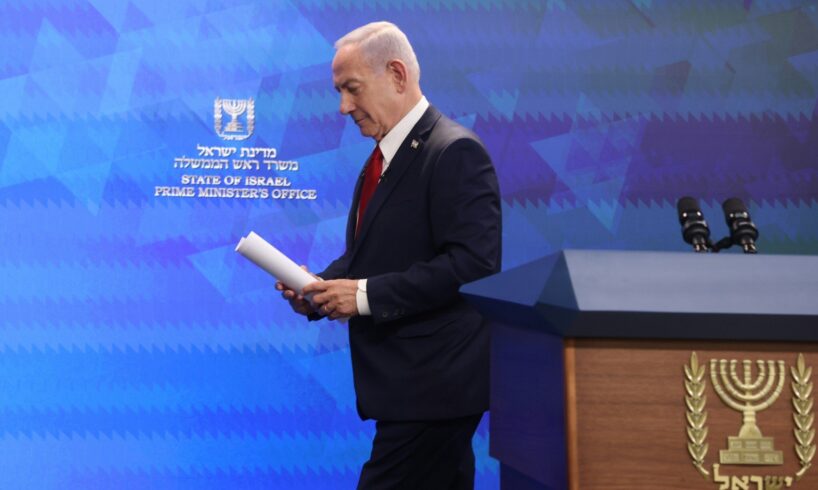
As was widely expected, the United Kingdom, Canada, Australia, and Portugal formally recognized a Palestinian state on Sunday.
Facing intense Israeli anger and accusations of rewarding terror, their leaders argued that the move would actually undermine Hamas and encourage peace based on a two-state solution.
“Portugal advocates the two-state solution as the only path to a just and lasting peace…a ceasefire is urgent,” said Portuguese Foreign Minister Paulo Rangel, adding that Hamas “cannot have any form of control in Gaza or outside it” and demanding the release of all hostages in the Strip.
British Prime Minister Keir Starmer said his country’s recognition was part of “a practical plan to bring people together behind a common vision and a series of steps, including the reform of the Palestinian Authority, that takes us from a ceasefire in Gaza to negotiations on a two-state solution.”
He added that the UK was sidelining Hamas: “Our call for a genuine two-state solution is the exact opposite of their hateful vision.”
Get The Times of Israel’s Daily Edition
by email and never miss our top stories
By signing up, you agree to the terms
Hamas itself appeared to disagree. Thanking the UK and Canada and calling their action a “victory,” senior Hamas official Mahmoud Mardawi tied the recognition to October 7, saying it “came thanks to the immense sacrifices” made by Palestinians since the Hamas attacks, especially those in Gaza.
L-R: British Prime Minister Keir Starmer gestures at a joint press conference with US President Donald Trump (unseen) following their meeting at Chequers, in Aylesbury, central England, on September 18, 2025. (Andrew Caballero-Reynolds/AFP); Canadian Prime Minister Mark Carney speaks at a press conference at the National Palace in Mexico City on September 18, 2025. (Yuri Cortez/AFP); Australian Prime Minister Anthony Albanese attends a flag-raising ceremony marking Papua New Guinea’s 50th independence anniversary in Port Moresby on September 16, 2025. (Andrew Kutan/ AFP)
Western leaders didn’t explain in any detail their second claim, that recognizing a Palestinian state with no strings attached advances a two-state solution.
Their move actually seemed to violate the 1995 Oslo II Accords, which stated clearly that “Neither side shall initiate or take any step that will change the status of the West Bank and the Gaza Strip pending the outcome of the permanent status negotiations.”
Nor did they demand any concessions from the Palestinians, beyond a letter of intent from Palestinian Authority President Mahmoud Abbas to French President Emmanuel Macron.
“These reported allies of ours have recognized a Palestinian state that doesn’t recognize us,” said ex-lawmaker and former Israeli ambassador to the US Michael Oren, “that doesn’t recognize our legitimacy, that does not recognize the existence of a Jewish people, that does not recognize the existence of a Jewish people with a connection to our homeland, a Palestinian state that glorifies terror, that educates its kids to kill Jews.”
Palestinian Authority President Mahmoud Abbas at the opening session of the Palestinian Central Council, in the West Bank city of Ramallah on April 23, 2025. (Flash90)
It can also be argued that the wave of recognitions also makes the release of the hostages and the end to the suffering of Gaza’s civilians harder to attain. Hamas isn’t going to free the hostages and agree to disarm if holding out means snowballing international pressure on Israel and growing achievements for the Palestinian cause.
On the ground, Palestinians can expect little improvement as a result of the wave of recognitions. The war in Gaza won’t be shortened by it and Hamas won’t be sidelined.
“Recognition of a pretend Palestinian state lays bare the real problem with the question of ‘Palestine,’” argued Danielle Pletka, senior fellow at the American Enterprise Institute. “No one actually cares about real, living Palestinian Arabs – their rights, their prosperity, the viability of their pretend state.”
Israelis rally for the release of captives held by Hamas-led terrorists in Gaza, at Hostage Square in Tel Aviv on September 20, 2025. (Jack Guez/AFP)
If anything, Starmer and company are likely strengthening the hands of hardliners in Israel who want to see much of West Bank annexed.
In Israel’s current political climate, it’s rare for the entire Zionist political spectrum to agree on anything. Perhaps the most impressive aspect of Sunday’s announcements was its ability to bring together Israelis from across the political spectrum in rejecting the move.
Opposition Leader Yair Lapid called the recognition “a harmful step, and a reward for terror.” Yair Golan, chairman of the left-wing Democrats party, said recognition was “destructive” and “extremely damaging” to Israel.
Britain’s Prime Minister Keir Starmer (left) greets President Isaac Herzog on the steps of 10 Downing Street in central London on September 10, 2025. (Toby Shepheard / AFP)
“It will not help a single Palestinian,” said the usually genteel and understated President Isaac Herzog “It won’t help free a single hostage, and it will not help us reach any settlement between Israelis and Palestinians. It will only embolden the forces of darkness. This is a sad day for those who seek true peace.”
Far-right National Security Minister Itamar Ben Gvir said the move was “a prize for the murderous terrorists.”
The Hostages and Missing Families Forum accused the recognizing countries of “turning a blind eye to the fact that 48 hostages remain in Hamas captivity.”
Prime Minister Benjamin Netanyahu has plenty of political backing to respond in some manner to the recognition. But he will need to tread carefully. Within his coalition, the refrain is annexation. Failing that will further disappoint his right-wing flank, which hasn’t so far been able to advance its dream of resettling the Gaza Strip or facilitating the mass emigration of Gazans.
Annexation carries serious risks. Israel’s Arab partners, and those it is hoping to court, will be forced to respond. They are already seething over the strike on Hamas leaders in Doha, and this will be an even harder pill to swallow. Leaders will be called collaborators on the viciously anti-Israel Arab street, which they view as a perpetual threat of violent revolution.
The US-oriented Arab leaders and Turkey, who enjoy close personal relationships with Donald Trump, will be pressing the US president this week at the UN to order Netanyahu not to annex.
US President Donald Trump arrives with Saudi Crown Prince Mohammed bin Salman for the group photo with Gulf Cooperation Council leaders during the GCC Summit in Riyadh, Saudi Arabia, May 14, 2025. (Alex Brandon/AP)
There are plenty of administration voices around Trump who would see annexation as a gratuitous move by an Israeli government that expects Washington to bail it out after repeatedly angering Washington’s natural allies in the region through a series of aggressive policies.
Netanyahu seems to realize this precarious reality. He has promised a response, but said it would only come after he meets with Trump next week in Washington.
There, he will have to come up with a course of action that meets ostensibly conflicting imperatives — deter more countries from recognizing a Palestinian state, avoid pushing Arab states to punish Israel, and keep disappointed coalition partners from jumping ship.
And, of course, he has to maintain full coordination with Trump. If the president gets fed up with Netanyahu, he could pull his blanket support for Israel’s current campaign in Gaza City. Without Trump’s backing, Israel’s best leverage over Hamas to accept defeat will be gone, and with it any hope of both ending the terror group’s reign in Gaza and freeing all the hostages.





